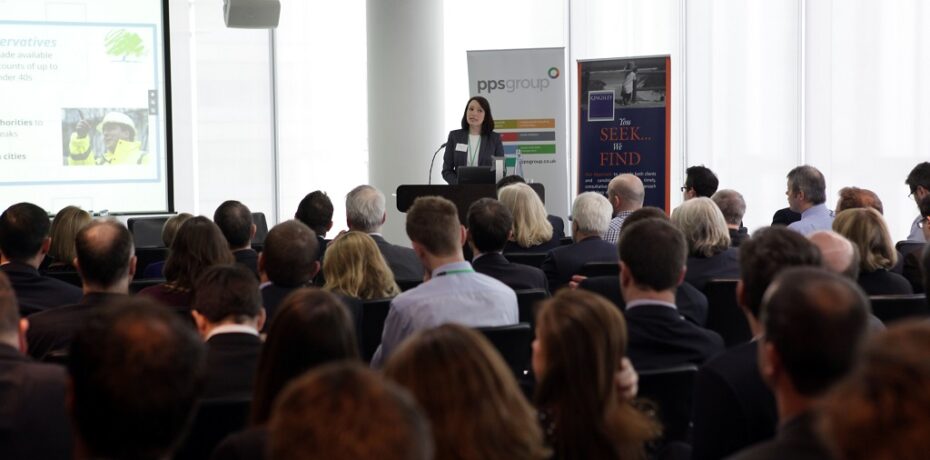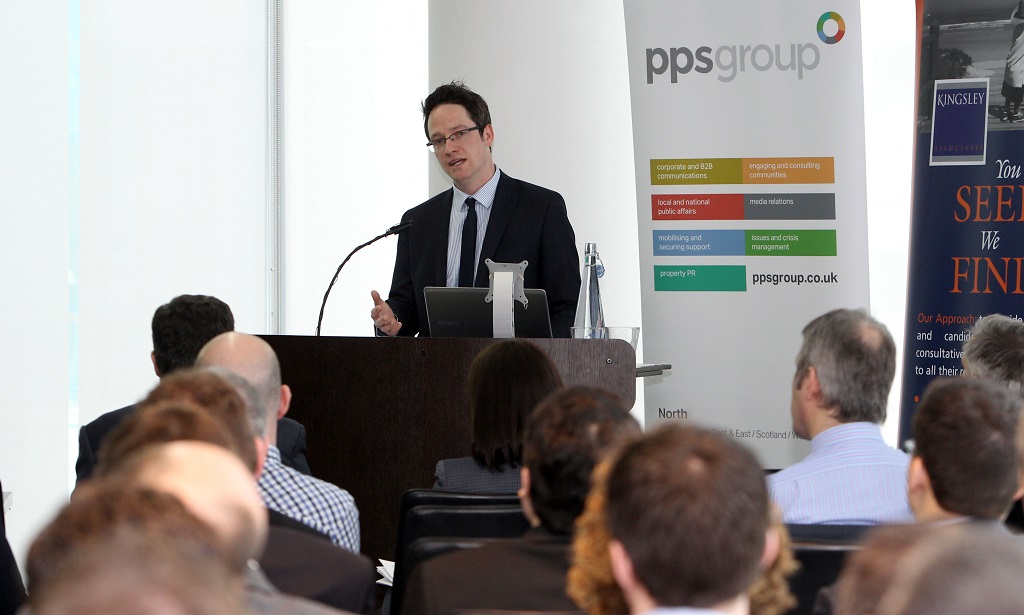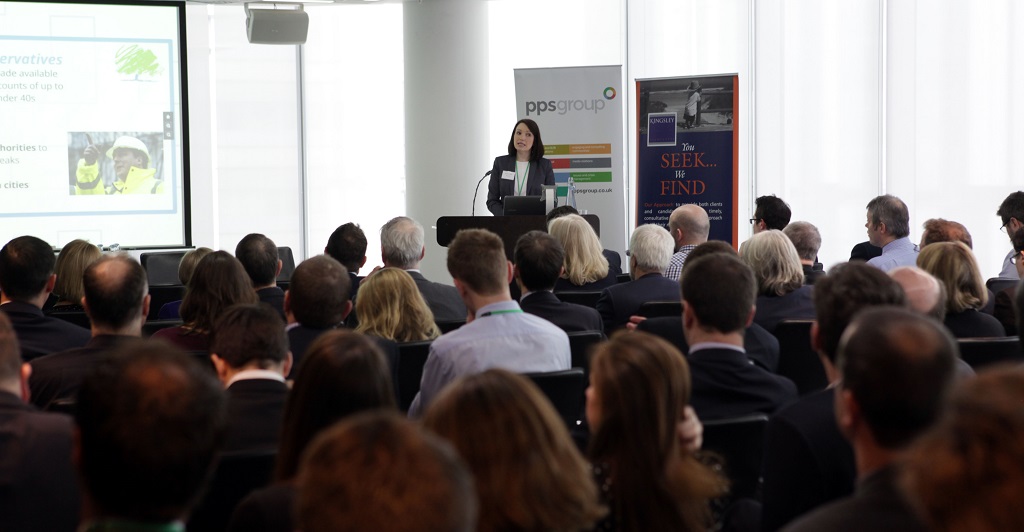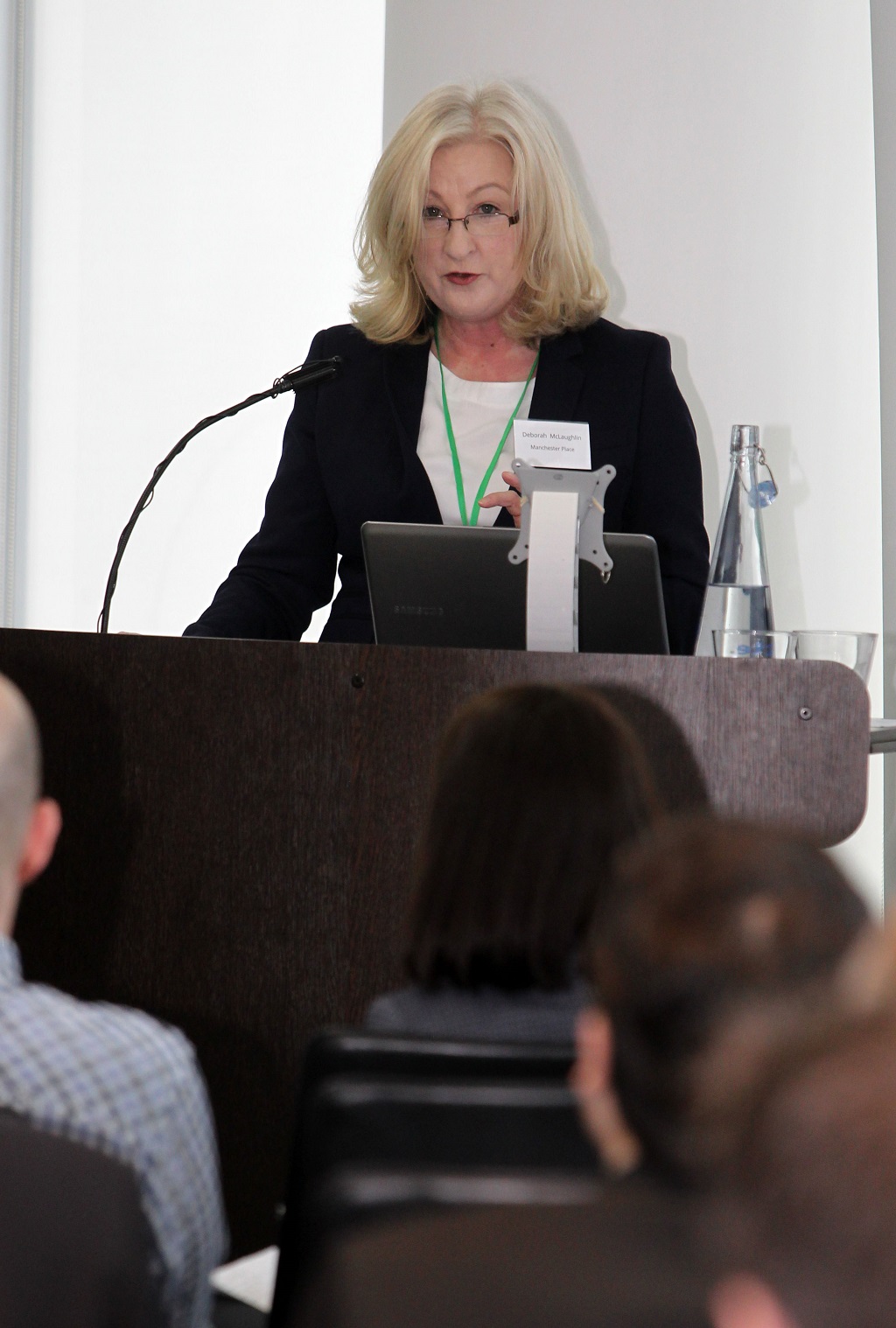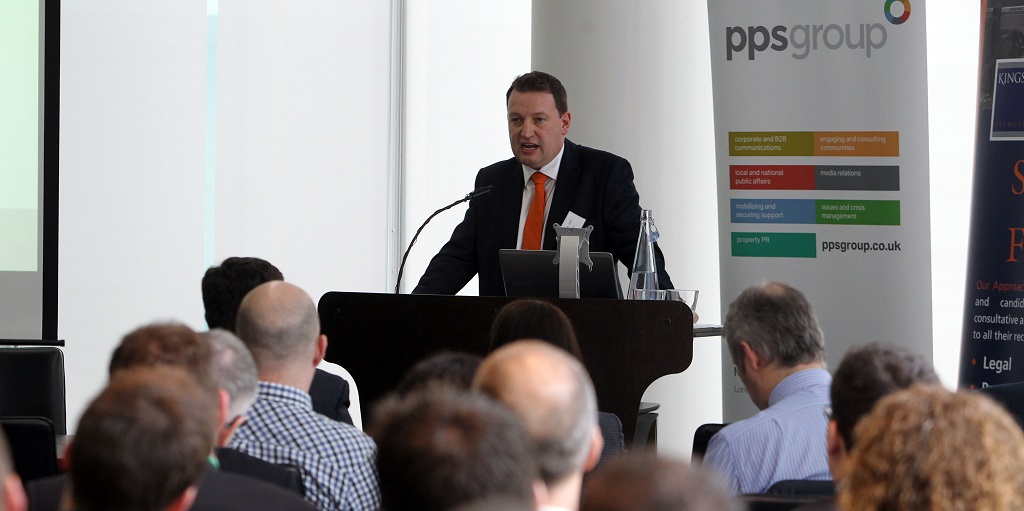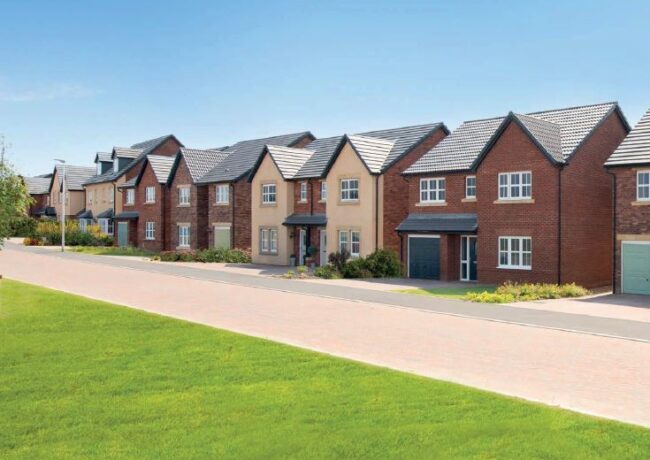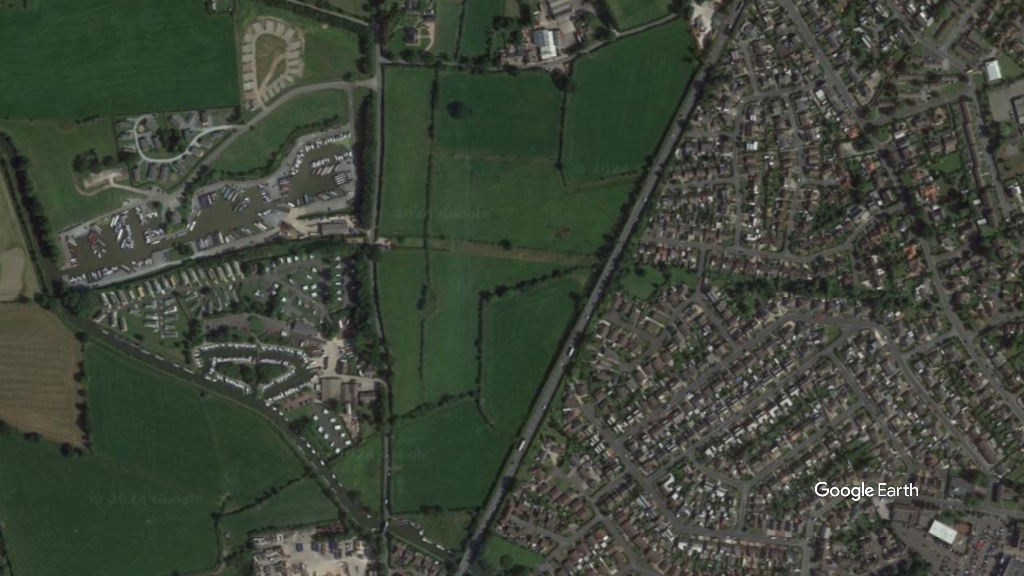Event Summary
Place RESI 2015: summary, slides + images
 The latest annual Place RESI conference explored the state of the North West economy, Manchester’s development pipeline, the issue of housing in the upcoming General Election, and the future of the private rented sector.
The latest annual Place RESI conference explored the state of the North West economy, Manchester’s development pipeline, the issue of housing in the upcoming General Election, and the future of the private rented sector.
The conference was sponsored by Hill Dickinson, Deloitte Real Estate, PPS Group, and Kingsley Associates. Speakers included Graham Stock and John Cooper, partners at Deloitte Real Estate, Rebecca Eatwell, director of PPS Group in the North, Deborah McLaughlin, chief executive of Manchester Place, and Matthew Pratt, regional chief executive of Redrow Homes.
See below for slides and gallery
Stock, head of planning at Deloitte Real Estate, opened proceedings with an overview of an improving UK economy. He talked the audience through recent research which showed financial officers’ appetites for risk was at its highest since before the recession, while construction output showed a growth rebound at the start of 2015.
Younger market
When it came to national housing growth figures, Stock said one of the most striking statistics was a 1.5m rise in renters between 2001 and 2011, compared to an 110,000 increase in owner occupiers. In Manchester, this was partly attributed to a 50% growth in the number of people aged under 30 years old in the city.
“It’s important that we’re aware of how the population is changing, and how this younger population will affect the market in the future,” said Stock. “Around 67% of people working in the North West got a degree from the region, and this graduate retention is indicative of where the market is heading.”
Both Stock and Deloitte colleague John Cooper presented a strong picture of the regional economy. GVA growth in the North West was 3.1% in 2014, fuelled largely by the professional and financial services sector.
However, private housebuilding was yet to return to pre-recession levels, with many schemes still being brought forward through Government support according to Cooper.
“It’s striking that the national housebuilders are yet to come back to play in Manchester,” said Cooper. “The current position is a shortfall of delivery. Manchester City Council leader Sir Richard Leese is publicly maintaining that ‘Manchester is full’, with a 97% city centre occupancy.”
Development was being driven by private rented sector schemes such as Property Alliance Group’s Axis in Whitworth Street and Moda Living’s Angel Gardens at NOMA, which are both under construction.
According to Cooper, the quality control seen in PRS was reassuring for the housing market, as “we can’t afford for our legacy in the next 20 years to be of poor accommodation”.
“If development is not checked by the planning sector, we’re not going to get the attractive housing that Manchester needs,” he said.
General Election interest
With the General Election imminent, how housing fits into the political scene was a hot topic at Place RESI. Rebecca Eatwell, director of integrated communications agency PPS Group, looked at the politics of planning and ran through the policies of each of the major parties. She said: “Housing as an election issue has never been so important.”
Eatwell predicted no big planning reforms from the Conservatives, and a housebuilding policy that looked at quality rather than quantity. Both Labour and the Liberal Democrats have made housebuilding targets; Labour has committed to 200,000 new homes annually by 2020, while the Liberal Democrats has gone further with 300,000 each year through the delivery of 10 garden cities.
In terms of the minority parties, “new housing can prove a decisive issue in areas such as the green belt,” explained Eatwell. “This gives smaller parties the change to poll strongly in local areas on an anti-development platform, such as UKIP and the Greens.
“Aggressive campaigning is expected, as coalition partners try to distance themselves from one another, Labour tries to offer a credible alternative and all main parties try to fight off the UKIP charge.”
Manchester Place in time
Working at the forefront of Manchester’s residential agenda, Deborah McLaughlin, chief executive of Manchester Place, gave an introduction to the newly-established collaboration between Manchester City Council and the Homes & Communities Agency, which aims to support the construction of 55,000 new homes by 2027. Focus areas are Ancoats, New Islington, Piccadilly Gateway, New Cross and Collyhurst.
“People want to move into the city centre and Manchester generally. Manchester Place’s target is to build the pipeline, unlock development, assemble land and create new neighbourhoods, and, if necessary, we will use CPO powers,” she said.
Developing at a high quality was essential said McLaughlin, with Manchester set to establish a panel to define the city’s model for residential design, initially using the London Housing Design Guide used as a benchmark.
Meeting the needs of Manchester’s growing younger population was a priority for McLaughlin. “Renting is becoming the tenure of choice, so our immediate focus is on the long-term private rental sector. The younger population in Manchester is a vocal market who will demand high standards.”
House truths
Speaking from a housebuilder’s perspective, Matthew Pratt, Redrow’s regional chief executive for the North of England, North Wales & Midlands, gave an overview of current projects on site, such as 950 homes at the former Woodford Aerodrome in Stockport, and 120 homes at the 40-acre Saighton Camp in Chester.
Pratt was optimistic about the impact housebuilding could have on the economy, due to the labour-intensive nature of the work and a supply chain that relied on UK-based manufacturing. However, a problematic planning process was something that was causing schemes to stall.
“In 2014 there were 253,000 homes granted planning permission, and 130,000 started on site. This disparity can be attributed to delays during the reserved matters process, which provides an opportunity for local objectors to find problems with the scheme.”
Despite the likelihood of housing being a key issue on the political campaign trail in the run-up to the May elections, Pratt was dubious about how much headway could be made without a national change in mindset.
“Housing may be up on the political agenda, but you need a balance of people who want to build new houses, and those that don’t want them built near them.”
Questions from the floor focused on the true viability of PRS, how to plug the housing supply deficit, and the conflict between national and local policies when it comes to building homes.
Speaking about the Place RESI event, Stock added: “What the event re-confirmed to me was that there is no doubt that there is a particular confidence around Manchester’s residential market. Deborah’s insights into the joint working of the HCA and city council to bring schemes forward were fascinating, and when that’s combined with the basic socio-economics of a dynamic, ever younger, growing population in a city that retains its graduates, together with all of the interest around, for example, PRS, one can see why there is so much energy in the market.
“Looking further across the region, when you hear from leading players like Redrow that demand for land in the right locations of course is essentially unabated you can understand why during the Q&A none of the delegates at the conference could really envisage a point coming where too many houses were being built in the North West.”
Click below for slides from the speakers:
- Graham Stock and John Cooper, Deloitte Real Estate
- Rebecca Eatwell, PPS Group
- Deborah McLaughlin, Manchester Place
- Matthew Pratt, Redrow Homes
Click any image below for gallery
- Packed room at last year's Place RESI event held at Deloitte in Spinningfields
- Stock stressed the importance of graduate retention
- John Cooper of Deloitte Real Estate gave an overview of Manchester projects
- Place RESI took place in the Deloitte Spinningfields office
- Rebecca Eatwell of PPS Group looked at the politics of planning
- Rebecca Eatwell of PPS
- Deborah McLaughlin of Manchester Place talked about development plans
- Redrow regional chief executive Matthew Pratt discussed the company pipeline
- Pratt emphasised parts of the planning system that were delaying developments
- The speakers returned for a panel discussion at the end of the conference
- Brian Gowthorpe of Arup asked a question from the floor
- Place North West editor Paul Unger chaired the debate
- Networking took place before and after the event
- McLaughlin of Manchester Place


